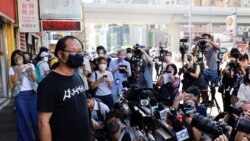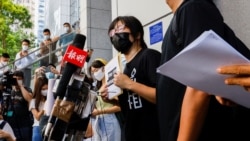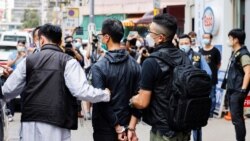One of Hong Kong’s biggest civil society groups, responsible for the annual Tiananmen Square vigil, has passed a resolution to disband after months of intensified political pressure.
The Hong Kong Alliance in Support of Patriotic Democratic Movements of China is the latest civil society group in the city that has decided to fold, with several of its leaders currently in jail.
On Saturday, members held an emergency general meeting that saw dozens vote for the group to end its 32-year existence.
Group secretary Richard Tsoi said it was “sad to announce the alliance has come to an end”, Radio Television Hong Kong (RTHK) reported.
The alliance was known for assembling Hong Kong’s annual candlelight vigil commemoration following the 1989 Tiananmen Square crackdown in Beijing. Tens of thousands attended the memorial that usually took place in Hong Kong’s Victoria Park. But for the past two years, authorities have banned the memorial, citing the COVID-19 pandemic.
Chairman Lee Cheuk Yan and Vice Chairman Albert Ho, who reportedly had withdrawn from the group earlier, had sent letters from jail calling for the group to disband.
Lee and Ho are both serving jail sentences following offenses and outstanding charges. Both pleaded guilty in May of participating in an illegal assembly during 2019 anti-government protests.
Fading light
Lee spoke with VOA earlier this year prior to going to jail and predicted the national security law would make it “very difficult” for the annual vigil to be legally approved again.
“It’s not [just] the Tiananmen Square vigils, it’s everything that has an attraction for the masses,” he said at the time.
Vice Chairwoman Hang Tung Chow admitted in August that the group had been debating whether to disband, and said that if the time would come to dissolve, it would be a “huge blow.”
The alliance, she said, "has been occupying such a key position within the civil society in Hong Kong. We have a long tradition of organizing one of the biggest assemblies each year. It is the biggest sign of opposition to the Chinese Communist Party.”
Chow is facing charges in relation to promoting unauthorized assembly for this year’s June 4 candlelight vigil. But she was arrested again earlier in September after rejecting a police demand to surrender information in response to allegations that the alliance was an agent of “foreign forces” – a crime under the security law.
She told VOA before her arrest that the allegations were “absurd” and that authorities were “fishing.”
“There is no proper information linking us with any so-called foreign agents. They just label us as a foreign agent, such as they can use that power to demand information,” she added.
National security law
Following the police demands, Chow, Lee and Ho were charged under the national security law for allegedly inciting subversion to state power. The group later deleted all online messages and closed its website after a demand by police.
Several other prominent groups in Hong Kong have recently ceased operations. The Civil Human Rights Front, also responsible for some of Hong Kong’s largest protests, disbanded last month after Hong Kong police said the group might have violated the national security law.
The Global Times, a state-affiliated newspaper, had previously written that the ending of the Hong Kong alliance was “long-awaited,” saying it was an “anti-China” organization that was “doomed to end.”
But political analyst Joseph Cheng, formerly of Hong Kong, told VOA by email the disbandment of the group was a loss to the city in several ways.
“The continued organization of the June 4 candlelight vigil every year had been most important," he wrote. "It generated a significant impression on people in China and Chinese tourists in Hong Kong. It had good money-raising power, which revealed its support. It even managed to establish a museum. It symbolized the connection between the pro-democracy movement in Hong Kong and that in China.”
‘Model is gone’
But Cheng, now in New Zealand, said there was “no room for survival” for pro-democracy organizations.
“This is part of the campaign to crack down on the territory’s civil society," he wrote. "The alliance has probably more symbolic value in that its formation in 1989 led to the formation of pro-democracy parties immediately afterwards. Its continued operation after [Hong Kong’s handover from Britain to China in] 1997 was perceived to be the symbol of tolerance of the 'one country, two systems' model.
“That model is gone,” he added.
Eric Yan-ho Lai, an analyst in law, politics and social movement, and a fellow at Georgetown University Law School, told VOA that the alliance would be remembered for upholding “righteousness" and its search for the truth.
“The disbandment of HKA is a loss for people in Hong Kong and the mainland, as well as the international community that still don’t forget the tragedy in 1989,” he said.
The Hong Kong alliance was founded weeks before the events of June 4 1989, in Beijing’s Tiananmen Square, where China’s People’s Liberation Army violently cracked down on pro-democracy demonstrators, leaving unknown numbers killed. One of its symbolic stances was calling for an end to one-party rule in China.
Hong Kong saw months of anti-government protests in 2019 that sometimes turned violent. The unrest prompted Beijing to implement the national security law in June 2020.
The legislation is being used by Hong Kong authorities to crack down on political dissidents, and it criminalizes acts deemed as subversion, secessionism, or a form of foreign collusion and terrorism. Since the law became active, dozens of pro-democracy activists and lawmakers have been charged, and one has been jailed.








